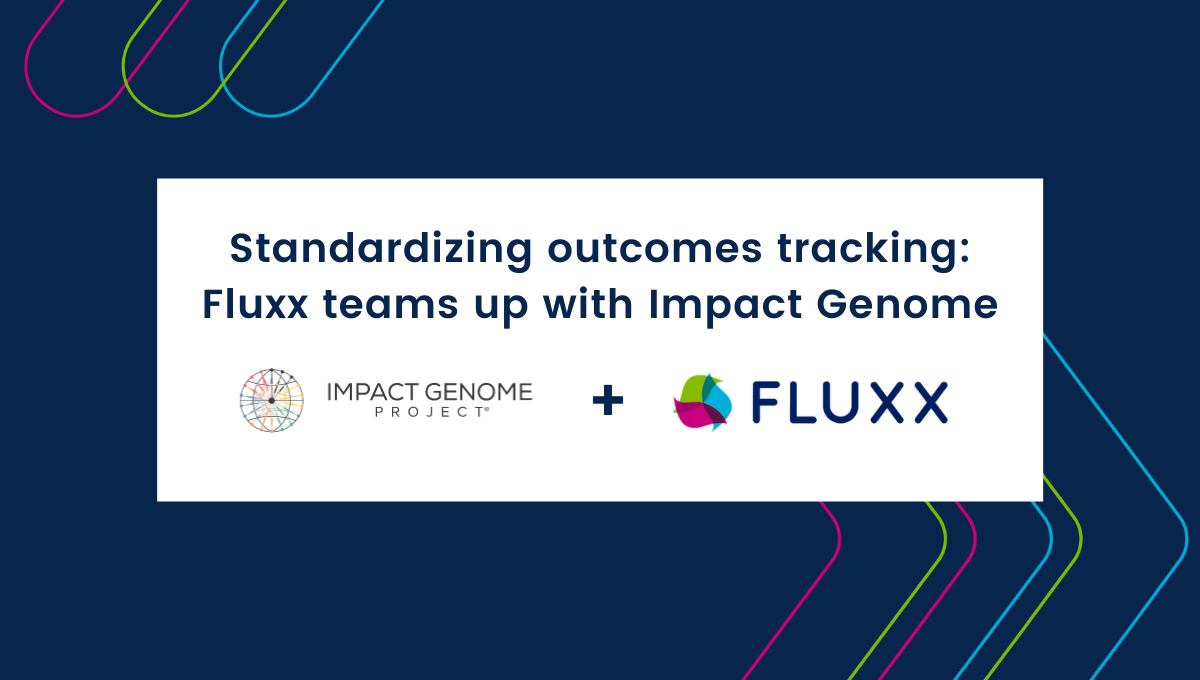
More than a decade into helping philanthropic organizations improve their operations, build mutually beneficial relationships with grantees, drive social impact, we, at Fluxx, recognize that we are a part of an ecosystem of communities and technologies.
As such we strive to support and honor initiatives that further the collective endeavors to connect efforts, amplify outcomes, and forge new ways of collaborating.
To collaborate effectively, we have to create common denominators across our programs, organizations, and industry --- Impact Genome is the most interesting example of how this can happen for impact tracking.
We listened to the building groundswell of interest from our customer to tie into these efforts. Today we are honored to announce a new partnership between Fluxx the team at Mission Measurement and Impact Genome.
Announcing Fluxx's new partnership with Impact Genome
With this new collaboration, Fluxx will integrate with the Impact Genome’s universal nonprofit impact registry to help standardize and quantify social impact and outcomes.
“This is a new day for philanthropy. A simple idea – creating a common, centralized registry for nonprofits to store their impact data – has the potential to revolutionize the social sector,” said Jason Saul, CEO, the Impact Genome Project. “By integrating with the Impact Genome, Fluxx is leading the field toward greater equity, transparency and accountability.”
For funders, a common registry enables a new generation of functionality, including ‘closest matching’ searches, verified impact reporting, portfolio analysis, and benchmarking. For nonprofits, access to the Impact Genome’s standardized and centralized registry will reduce administrative costs and avoid the need to continuously enter the same data into different grant systems, such as Fluxx.
"One of the key legacies of the global crises of the past two years is that we need shared infrastructure to ease nonprofit burden,” said Chantal Forster, executive director, Technology Association of Grantmakers. “Increasingly, grantmakers have realized that investing in common data and shared technology tools across the sector reduces nonprofit overhead, improves equitable access to funding, and enables room for trust-building and collaboration."
For Grantmakers: A New Way to Invest in Social Impact
The Impact Genome provides an objective and efficient way to source, compare, and independently evaluate social impact, enabling grantmakers to operate more like investors. The system also offers grantmakers the ability to view individual grantee scorecards as well as aggregate impact reports, rolling up common data from across their entire grants portfolio. Even before they make a grant, funders can view standardized, comparable impact data on more than two million nonprofit organizations in the U.S. and Canada.
The impact registry’s ‘closest matching’ search feature allows funders to find nonprofits that focus on specialized outcomes aligned to their strategic priorities. Organization matching can help to streamline an RFP process and reduce unqualified grant applications.
“Integrating with the Impact Genome’s universal registry enables Fluxx to help our customers to benchmark and act on their social impact data,” said Kerrin Mitchell, chief development officer and co-founder, Fluxx. “By standardizing on impact taxonomies, we can reduce the reporting burden on grantees and continue to forge relationships between givers and doers.”
For Nonprofits: Accelerating Access to Funding
The Impact Genome’s universal registry will automate grant applications and reports by allowing nonprofits to store and access organizational and program data from a centralized clearinghouse. Currently, nonprofits spend 15 hours or more on each grant report amounting to billions of dollars spent on redundant administrative tasks each year. With a universal registry, nonprofits can store information on their program design, beneficiaries, theory of change, impacts, DEI, and evidence in one centralized location.
By using a registry, nonprofits can now be more discoverable by funders seeking to fund specific social impact and beneficiaries. This new level of discoverability is intended to help nonprofits of all sizes be equally capable of competing for funding based on their ability to deliver results, instead of their marketing materials or connections.
Standardized data will also help nonprofits tell their social impact stories in consistent and structured ways, using data on program efficacy and cost-per-outcome. The Impact Genome also helps nonprofits set quantifiable goals and provide outcomes-based reports to funders, increasing transparency between grantor and grantee.
For changemakers interested in utilizing Fluxx to power their giving and track their impact, book time to meet the Fluxx team and see our product in action here.
Read the full press release here.